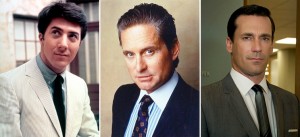Alliterative Cinematic Generational Icons
Monday, June 11th, 2012 • Movies
What do Benjamin Braddock, Gordon Gekko and Don Draper have in common (beyond the obvious strained comparison)? The alliterative naming isn’t always a writer’s deliberate stab at mythmaking, but it’s a self-conscious maneuver that draws attention to the character’s archetypal characteristics by leveraging your mnemonic systems, forcing you to memorize the name even if you don’t want to (just ask Superman, whose past and present unrequited love interests and mortal enemy all come with double-L brands).
Braddock, The Graduate‘s title role, was famously miscast (the protagonist of Charles Webb’s novel is a Redford type, and Redford was nearly cast before a famous verbal exchange with Mike Nichols* shut him out of the role)—Dustin Hoffman was ten years too old and physically wrong for the athletic letterman/scholar character but his distillation of his generation’s famously opaque confusion (the most important conversation in the movie—the moment when he connects with Elaine—is inaudible) was a compelling Rorschach blot for people just a little too old to scream for the Beatles.
Gekko and Draper are each “throwbacks,” but in different ways: Gekko was cut from the thick nostalgic cloth of Reagan-era yearning for the lost glories of a pre-New-Deal robber-baron epoch, although his forceful counter-reformation against regulation, forbearance and (really) common decency was coated in 1980s irony (just remember his self-effacing grimace to future “winner” Charlie Sheen after his “Greed is Good” speech). He know’s he’s perpetually onstage (even when the proscenium is just Oliver Stone’s gold-burnished widescreen Panavision frame).
As retro-emotion-magnets go, Don Draper has the advantage of actually being from the past (from Braddock’s era, actually), although it’s obviously an invented, synthesized past meant to comment on the present and the intervening decades, distilling the lessons of Braddock’s and Gekko’s America through the lens of post-iTunes/DVDs, post-Sopranos long-form “episodic televised cinema” (or whatever we’re supposed to call this burgeoning new art form that works like television but breaks down into seasons rather than episodes as discrete storytelling blocks). Draper’s easily the deepest of the three characters; when he makes his big pitches, we can hear them (and they’re significantly more sophisticated and existential than Gekko’s one-note pep talks—in this longer, more detailed storytelling format, Gekko’s embryonic acquisitive appetites have mellowed into a sadder, more profound yearning in the John Cheever mode that nonetheless remains as grimly insistent as it was twenty-five years ago).
It’s a completed syllogism: Draper aims Gekko’s argument straight back at Braddock, crossing the decades to insist that the generation “On the Barricades” re-locate their marbles (or, at least, just reach for their wallets). Some grandiose impulse makes a writer bang the same key twice when naming a protagonist; in these three cases, the inflated, iconic ambitions were fulfilled.
* Nichols asked Redford if he’d ever been rejected. Redford replied, “Define ‘rejected.'” Re-telling the anecdote, Nichols basically explained that that was it—there was just no way that Redford could get into the character of Braddock.
